About
WorldShift 2012 is a global movement dedicated to co-creating the foundations of a peaceful, just and sustainable world by the end of 2012. It draws attention to the global state of social, economic and environmental emergencies we now face, and proposes a series of actions and solutions to help humanity deal with the problems we may encounter.
WorldShift 2012 seeks to unite and engage everyone in this process by signing the WorldShift 2012 Declaration and to collectively and consciously commit to the process of transformational change required.
WorldShift 2012 was initiated by The Club of Budapest with the support of Campaign Promotions, Positive TV and Events4Change and cooperating partners including The Alliance for a New Humanity, The Goi Peace Foundation, The Institute of Noetic Sciences, The State of the World Forum, First Noosphere World Congress, HUB (Humanity Unites Brilliance), Architects of a New Dawn, The Art of Living Foundation, The Jane Goodall Institute, Renaissance2, The Lifeline, The World Wisdom Council, The WorldWide Fund for Nature and 999 It's Time with other organisations joining daily...
Please take the time to read the WorldShift 2012 Declaration and support us by signing it and by actively participating in WorldShift Events, Activities and Solutions; by donating to The WorldShift Fund and / or by investing in WorldShift Finance.
The Club of Budapest

The Mission
The Mission of the Club of Budapest is to be a catalyst for the transformation to a sustainable world through
- promoting the emergence of planetary consciousness
- interconnecting generations and cultures
- integrating spirituality, science, and the arts
- fostering learning communities worldwide
The philosophy of the Club of Budapest is based on the realization that the enormous challenges that humanity is currently facing can only be overcome through the development of a global cultural consciousness.
The view of the Club of Budapest is focused on a cultural consciousness with a global perspective.
Like Greenpeace fights for ecological issues, UNICEF for children, and Amnesty International for human rights, the Club of Budapest stands for global consciousness. Its mission is to be a catalyst for the transformation to a sustainable world.
The Club perceives itself as a builder of bridges between science and art, ethics and economy, between cognition and realization, between old and young, as well as between the different cultures of the world.
For more, see www.clubofbudapest.org
Dr Ervin Laszlo
 Ervin Laszlo is Founder and President of The Club of Budapest, President of the WorldShift Network, Founder of the General Evolution Research Group, Co-Chair of the World Wisdom Council, Fellow of the World Academy of Arts and Sciences, Member of the International Academy of Philosophy of Science, Senator of the International Medici Academy, and Editor of the international periodical World Futures: The Journal of General Evolution.
Ervin Laszlo is Founder and President of The Club of Budapest, President of the WorldShift Network, Founder of the General Evolution Research Group, Co-Chair of the World Wisdom Council, Fellow of the World Academy of Arts and Sciences, Member of the International Academy of Philosophy of Science, Senator of the International Medici Academy, and Editor of the international periodical World Futures: The Journal of General Evolution.
He has a PhD from the Sorbonne and is the recipient of honorary PhD’s from the United States, Canada, Finland, and Hungary. Formerly Professor of Philosophy, Systems Science, and Futures Studies in various universities in the US, Europe, and the Far East, he lectures worldwide.
Laszlo received the Peace Prize of Japan, the Goi Award, in 2002, the International Mandir of Peace Prize in Assisi in 2005, and was nominated for the Nobel Peace Prize in 2004.
He is the author or co-author of fifty-four books translated into as many as twenty-two languages, and serves as editor of another thirty volumes in addition to a four-volume World Encyclopedia of Peace. He lives in a converted four-hundred year-old farmhouse in Tuscany.
For more, see http://en.wikipedia.org/wiki/Ervin_Laszlo and watch this series of videos in which Dr Ervin Laszlo talks about his journey from founding father of Systems Theory to his concept of WorldShift 2012.
Honorary Members
The Honorary Members of The Club of Budapest include
- Ervin Laszlo (Scientist / Philosopher / Founder & President of The Club of Budapest / Author of WorldShift 2012)
- Oscar Arias (Statesman / Nobel Peace Laureate)
- A.T. Ariyaratne (Buddhist Spiritual Leader)
- Thomas Berry (Theologian / Scientist)
- Karlheinz Böhm (Actor / Activist)
- Deepak Chopra (Physician, Spiritual Leader)
- Paulo Coelho (Writer)
- Mihaly Csikszentmihalyi (Psychologist)
- The XIVth Dalai Lama (Spiritual Leader / Nobel Peace Laureate)
- Riane Eisler (Feminist Historian / Activist)
- Vigdis Finnbogadottir (Political Leader / Nobel Peace Laureate)
- Milos Forman (Film Director)
- Peter Gabriel (Musician)
- Hans-Dietrich Genscher (Statesman)
- Jane Goodall (Scientist)
- Rivka Golani (Musician)
- Mikhail Gorbachev (Opinion Leader / Statesman)
- Arpád Göncz (Writer / Statesman)
- Václav Havel (Writer / Statesman)
- Hazel Henderson (Economist / Activist)
- Bianca Jagger (President, Bianca Jagger Human Rights Foundation)
- Miklós Jancso (Film Director)
- Ken-Ichiro Kobayashi (Orchestra Director)
- Gidon Kremer (Musician)
- Hans Küng (Christian Spiritual Leader)
- Shu-hsien Liu (Chinese Philosopher)
- Eva Marton (Opera Singer)
- Zubin Mehta (Orchestra Director)
- Edgar Mitchell (Scientist / Astronaut)
- Edgar Morin (Philosopher / Sociologist)
- Robert Muller (Educator / Activist)
- Raffi (Singer, Children’s Cause Activist)
- Mary Robinson (Political and Human Rights Leader)
- Peter Russell (Philosopher / Futurist)
- Masami Saionji (Japanese Spiritual Leader)
- Karan Singh (Hindu Spiritual Leader)
- Rita Süssmuth (Political Leader / Activist)
- Sir Sigmund Sternberg (Interfaith Spiritual Leader)
- Archbishop Desmond Tutu (Spiritual Leader / Nobel Peace Laureate)
- Liv Ullmann (Actor / Director)
- Muhammad Yunus (Economist / Nobel Peace Laureate)
Other CoB Initiatives
The WorldShift Network
 On the 12th of June 2007, Ervin Laszlo’s 75th birthday, the Club of Budapest WorldShift Network was established as an international foundation. The purpose of the foundation is to connect the many organizations and individuals throughout the world who are presently working for a values-based holistic civilization and to strengthen their effectiveness.
On the 12th of June 2007, Ervin Laszlo’s 75th birthday, the Club of Budapest WorldShift Network was established as an international foundation. The purpose of the foundation is to connect the many organizations and individuals throughout the world who are presently working for a values-based holistic civilization and to strengthen their effectiveness.
The WorldShift Network focuses on six topics taken as organic components of an ongoing change of consciousness:
- Unity of Humanity and Nature (shifting from domination to unity)
- Global Subsistence Economy (shifting from exploitation to sustainability)
- Salutogenesis (shifting from disease control to the safeguarding of health)
- Global Wisdom Culture (shifting from ego-centered knowledge to holistic wisdom)
- Participative Civil Society (shifting from domination to participation)
- Planetary Peace and Freedom (shifting from separation to community)
The WorldShift Alliance
The WorldShift Alliance is to serve as a “mega-network” of like-minded individuals and organizations actively addressing our shared societal and ecological challenges and opportunities. The Alliance’s broad mission is: To effectively address humanity’s growing challenges and opportunities with new thinking and actions in sufficient time to adapt to rapidly changing world conditions.
Through a multifaceted “web community” the WorldShift Alliance is to bring the various sectors of society and the diverse cultures of the human family together with the thousands of individuals and groups who are actively working for a better world. It is to function as a worldwide community of global citizens and forward-thinking organizations who can together shift the human future to a peaceful and sustainable path.
The World Wisdom Council
In Partnership with the World Commission on Global Consciousness and Spirituality
The World Wisdom Council is to represent the collective wisdom of humanity, both masculine and feminine, and from every continent, major culture, and religion. Its core mission is to transcend narrow national agendas and self-serving individual interests, recognizing that thinking based on these levels cannot meet today’s growing global challenges. It has been convened in the conviction that the paramount requirement in this age of discontinuity and transformation is to recognize that, through the development of a new dimension of consciousness, the world can be constructively changed by women and men wherever they live and whatever their interests and lot in life.
The WWC is an independent body, with initial members drawn from the Club of Budapest and the World Commission on Global Consciousness and Spirituality.
The Global Peace Meditation/Prayer Days
 In Partnership with the World Peace Prayer Society
In Partnership with the World Peace Prayer Society
Numerous tests and experiments have shown that deep prayer and meditation can heal people, heal other species, and create peace and harmony in human communities. The annual Global Peace Meditation/Prayer Days were created to amplify the power of meditation to reduce the level of conflict and violence in the world and help create deeper understanding, tolerance, and readiness to live in peace with our neighbors near and far, as well as with nature.
The First Global Day, Sunday, May 20, 2007, brought together an estimated one million meditators in sixty-five countries on five continents. Never before have so many people in so many countries and from so many faiths and cultures joined together to direct the power of their meditation and prayer to the first truly common cause of all of humanity: peace on Earth.
Social Network
Join the Worldshift Social Network at worldshift.ning.com
- for more information about WorldShift 2012
- to meet and talk to Dr Ervin Laszlo and others involved
- to find a whole community of proactive, positive, transformational change-focussed Worldshifters
- to ask for advice and support for your own personal or organisational Worldshifting project
- to offer advice and support to others who may need your help
"This is Facebook with a purpose!"
The Manifesto on Planetary Consciousness
The Mission: The Manifesto on Planetary Consciousness
The mission of the Club of Budapest is stated in the Manifesto on Planetary Consciousness, drafted by Ervin Laszlo and the Dalai Lama and adopted at a meeting at the Hungarian Academy of Sciences in Budapest on the 26th of October, 1996.
The New Requirements of Thought and Action
- In the closing years of the twentieth century, we have reached a crucial juncture in our history. We are on the threshold of a new stage of social, spiritual, and cultural evolution, a stage that is as different from the stage of the earlier decades of this century as the grasslands were from the caves, and settled villages from life in nomadic tribes. We are evolving out of the nationally based industrial societies that were created at the dawn of the first industrial revolution, and heading toward an interconnected, information-based social, economic, and cultural system that straddles the globe. The path of this evolution is not smooth: it is filled with shocks and surprises. This century has witnessed several major shock waves, and others may come our way before long.
The way we shall cope with present and future shocks will decide our future, and the future of our children and grandchildren. - The challenge we now face is the challenge of choosing our destiny. Our generation, of all the thousands of generations before us, is called upon to decide the fate of life on this planet. The processes we have initiated within our lifetimes and the lifetimes of our parents and grandparents cannot continue in the lifetimes of our children and grandchildren. Whatever we do will either create the framework for reaching a peaceful and cooperative global society and thus continuing the grand adventure of life, spirit, and consciousness on Earth, or set the stage for the termination of humanity’s tenure on this planet.
- The patterns of action in today’s world are not encouraging. Millions of people are without work; millions are exploited by poor wages; millions are forced into helplessness and poverty. The gap between rich and poor nations, and between rich and poor people within nations, is great and still growing. Though the world community is relieved of the specter of superpower confrontation and is threatened by ecological collapse, the world’s governments still spend a thousand billion dollars a year on arms and the military and only a tiny fraction of this sum on maintaining a livable environment.
- The militarization problem, the developmental problem, the ecological problem, the population problem, and the many problems of energy and raw materials will not be overcome merely by reducing the number of already useless nuclear warheads, nor by signing politically softened treaties on world trade, global warming, biological diversity, and sustainable development. More is required today than piecemeal action and short-term problem solving. We need to perceive the problems in their complex totality, and grasp them not only with our reason and intellect, but with all the faculties of our insight and empathy. Beyond the powers of the rational mind, the remarkable faculties of the human spirit embrace the power of love, of compassion, and of solidarity. We must not fail to call upon their remarkable powers when confronting the task of initiating the embracing, multifaceted approaches that alone could enable us to reach the next stage in the evolution of our sophisticated but unstable and vulnerable sociotechnological communities.
- If we maintain obsolete values and beliefs, a fragmented consciousness, and a self-centered spirit, we also maintain outdated goals and behaviors. And such behaviors by a large number of people will block the entire transition to an interdependent yet peaceful and cooperative global society. There is now both a moral and a practical obligation for each of us to look beyond the surface of events, beyond the plots and polemics of practical policies, the sensationalistic headlines of the mass media, and the fads and fashions of changing lifestyles and styles of work, an obligation to feel the ground swell underneath the events and perceive the direction they are taking: to evolve the spirit and the consciousness that could enable us to perceive the problems and the opportunities—and to act on them.
A Call for Creativity and Diversity
- A new way of thinking has become the necessary condition for responsible living and acting. Evolving it means fostering creativity in all people, in all parts of the world. Creativity is not a genetic but a cultural endowment of human beings. Culture and society change fast, while genes change slowly: no more than one half of one percent of the human genetic endowment is likely to alter in an entire century. Hence most of our genes date from the Stone Age or before; they could help us to live in the jungles of nature but not in the jungles of civilization. Today’s economic, social, and technological environment is our own creation, and only the creativity of our mind—our culture, spirit, and consciousness—could enable us to cope with it. Genuine creativity does not remain paralyzed when faced with unusual and unexpected problems; it confronts them openly, without prejudice. Cultivating it is a precondition of finding our way toward a globally interconnected society in which individuals, enterprises, states, and the whole family of peoples and nations could live together peacefully, cooperatively, and with mutual benefit.
- Sustained diversity is another requirement of our age. Diversity is basic to all things in nature and in art: a symphony cannot be made of one tone or even played by one instrument; a painting must have many shapes and perhaps many colors; a garden is more beautiful if it contains flowers and plants of many different kinds. A multicellular organism cannot survive if it is reduced to one kind of cell; even sponges evolve cells with specialized functions. And more complex organisms have cells and organs of a great variety, with a great variety of mutually complementary and exquisitely coordinated functions. Cultural and spiritual diversity in the human world is just as essential as diversity in nature and in art. A human community must have members that are different from one another not only in age and sex, but also in personality, color, and creed. Only then could its members perform the tasks that each does best, and complement each other so that the whole formed by them could grow and evolve. The evolving global society would have great diversity, were it not for the unwanted and undesirable uniformity introduced through the domination of a handful of cultures and societies. Just as the diversity of nature is threatened by cultivating only one or a few varieties of crops and husbanding only a handful of species of animals, so the diversity of today’s world is endangered by the domination of one, or at the most a few, varieties of cultures and civilizations.
- The world of the twenty-first century will be viable only if it maintains essential elements of the diversity that has always hallmarked cultures, creeds, and economic, social, and political orders as well as ways of life. Sustaining diversity does not mean isolating peoples and cultures from one another: it calls for international and intercultural contact and communication with due respect for each other’s differences, beliefs, lifestyles, and ambitions. Sustaining diversity also does not mean preserving inequality, for equality does not reside in uniformity, but in the recognition of the equal value and dignity of all peoples and cultures. Creating a diverse yet equitable and intercommunicating world calls for more than just paying lip service to equality and just tolerating each other’s differences. Letting others be what they want as long as they stay in their corner of the world, and letting them do what they want “as long as they don’t do it in my backyard” are well meaning but inadequate attitudes. As the diverse organs in a body, diverse peoples and cultures need to work together to maintain the whole system in which they are a part, a system that is the human community in its planetary abode. Different nations and cultures must now develop the compassion and the solidarity that could enable all of us to go beyond the stance of passive tolerance, to actively work with and complement each other.
A Call for Responsibility
- In the course of the twentieth century, people in many parts of the world have become conscious of their rights as well as of many persistent violations of them. This development is important, but in itself it is not enough. In the 21st century we must also become conscious of the factor without which neither rights nor other values can be effectively safeguarded: our individual and collective responsibilities. We are not likely to grow into a peaceful and cooperative human family unless we become responsible social, economic, political, and cultural actors.
- We human beings need more than food, water, and shelter; more even than remunerated work, self-esteem, and social acceptance. We also need something to live for: an ideal to achieve, a responsibility to accept. Since we are aware of the consequences of our actions, we can and must accept responsibility for them. Such responsibility goes deeper than many of us may think. In today’s world all people, no matter where they live and what they do, have become responsible for their actions as:
- private individuals
- citizens of a country
- collaborators in business and the economy
- members of the human community
- persons endowed with mind and consciousness
As citizens of our country, we are responsible for demanding that our leaders beat swords into ploughshares and relate to other nations peacefully and in a spirit of cooperation; that they recognize the legitimate aspirations of all communities in the human family; and that they do not abuse sovereign powers to manipulate people and the environment for shortsighted and selfish ends.
As collaborators in business and actors in the economy, we are responsible for ensuring that corporate objectives do not center uniquely on profit and growth, but include a concern that products and services respond to human needs and demands without harming people and impairing nature, do not serve destructive ends and unscrupulous designs, and respect the rights of all entrepreneurs and enterprises who compete fairly in the global marketplace.
As members of the human community, it is our responsibility to adopt a culture of non-violence, solidarity, and economic, political, and social equality, to promote mutual understanding and respect among people and nations whether they are like us or different, and to demand that all people everywhere should be empowered to respond to the challenges that face them with the material as well as spiritual resources that are required for this unprecedented task.
And as persons endowed with mind and consciousness, our responsibility is to encourage comprehension and appreciation for the excellence of the human spirit in all its manifestations, and for inspiring awe and wonder for a cosmos that brought forth life and consciousness and holds out the possibility of its continued evolution toward ever higher levels of insight, understanding, love, and compassion.
A Call for Planetary Consciousness
- In most parts of the world, the real potential of human beings is sadly underdeveloped. The way children are raised depresses their faculties for learning and creativity; the way young people experience the struggle for material survival results in frustration and resentment. In adults this leads to a variety of compensatory, addictive, and compulsive behaviors. The result is the persistence of social and political oppression, economic warfare, cultural intolerance, crime, and disregard for the environment. Eliminating social and economic ills and frustrations calls for considerable socioeconomic development, and that is not possible without better education, information, and communication. These, however, are blocked by the absence of socioeconomic development, so that a vicious cycle is produced: underdevelopment creates frustration, and frustration, giving rise to defective behaviors, blocks development. This cycle must be broken at its point of greatest flexibility, and that is the development of the spirit and consciousness of human beings. Achieving this objective does not preempt the need for socioeconomic development with all its financial and technical resources, but calls for a parallel mission in the spiritual field. Unless people’s spirit and consciousness evolves to the planetary dimension, the processes that stress the globalized society/nature system will intensify and create a shock wave that could jeopardize the entire transition toward a peaceful and cooperative global society. This would be a setback for humanity and a danger for everyone. Evolving human spirit and consciousness is the first vital cause shared by the whole of the human family.
- In our world static stability is an illusion; the only permanence is in sustainable change and transformation. There is a constant need to guide the evolution of our societies so as to avoid breakdowns and progress toward a world where all people can live in peace, freedom, and dignity. Such guidance does not come from teachers and schools, not even from political and business leaders, though their commitment and roles are important. Essentially and crucially, it comes from each person himself and herself. An individual endowed with planetary consciousness recognizes his or her role in the evolutionary process and acts responsibly in light of this perception. Each of us must start with ourselves to evolve our consciousness to this planetary dimension; only then can we become responsible and effective agents of our society’s change and transformation. Planetary consciousness is the knowing as well as the feeling of the vital interdependence and essential oneness of humankind, and the conscious adoption of the ethics and the ethos that this entails. Its evolution is the basic imperative of human survival on this planet.
WorldShift Management
The WorldShift Management Team consists of a group of committed Changemakers with a wide range of appropriate skills and vast collective experience.
For more about any of the individuals involved, please click their link below.
Gareth Strangemore-Jones
 Gareth is Co-Initiator of the Worldshift 2012 Movement, Group Managing Editor of Worldshift Media and a Creative Member of the Club of Budapest.
Gareth is Co-Initiator of the Worldshift 2012 Movement, Group Managing Editor of Worldshift Media and a Creative Member of the Club of Budapest.
During a career in communications spanning more than 20 years, he has consistently delivered measurable business-generating and awareness-raising integrated regional, national, international and new media campaigns and communications.
For charities and social enterprises, Gareth has raised significant funds and awareness and effectively managed corporate social responsibility from a number of business sectors. A Fellow of the Foundation for Social Entrepreneurs, he won an UnLtd Millennium Award and was featured in their publication: “What Makes a Social Entrepreneur?”
In January 2009, Gareth helped launch 999 It's Time, a new movement drawing attention to the state of Social, Economic and Environmental Emergencies we face combined with practical actions we can all take and effect change, even as individuals. For more, see www.999itstime.org
In 2008, Gareth co-founded Events4Change as a social enterprise specialising in producing, programming and promoting tansformational events. Events4Change is a Founding Partner of WorldShift. For more, see www.events4change.org
In 2007-2008, Gareth founded Ecoshelter, a new social enterprise / charity coalition that seeks to provide sustainable and community living solutions for Disaster Relief, Poverty Relief and Environmental Relief.
The day after Boxing Day in 2004, Gareth set up a new fundraising charity, Tsunami Relief, which focussed the public, Rotarians and sister organisations to raise more than £24million to help the physical, mental and emotional rebuilding of those communities shattered by the earthquakes off Indonesia and the subsequent infamous tsunami.
In 2003 – 2004, Gareth promoted The European Social Forum that came to London for the first time, sitting on the influential Culture Working Group. He soon realised that many creative people could align with the ESF’s principle that “Another World is Possible” and so founded The European Creative Forum and co-ordinated and promoted its monthly “Visions of Another World” events.
In 2002, Gareth took a temporary consultancy with Brunel University. This complicated change-focussed communications task involved gaining the support of the local authority, Hillingdon Council; the Greater London Authority; the Department of Education; business and other stakeholders; staff, students and residents. During this term, Gareth took control as Head of PR. The consultancy was interupted when Gareth was stabbed in a racist attack on a friend of his, an incident that made him more determined to use communications to create a more open and tolerant society.
In 2001 – 2002, Gareth helped turn Callserve from a DotCom start up to a rare telco success with global marketing communications for what was then Europe’s leading VoIP provider and their brand partners including Sony (The Sony Vaiophone); Freeserve (The Freeserve Webphone); Packard Bell; Real Networks and Microsoft (The xpPhone). With Callserve, Gareth helped Microsoft launch Windows XP as VoIP communications was one of the most exciting features of their new Operating System.
In 2000 - 2001, in association with ImageLine (the UK’s leading Transport & Travel PR Agency), Gareth worked as Pan European PR Consultant for MOL (Mitsui OSK Lines – the largest shipping company in the World) and PANYNJ (The Port Authority of New York & New Jersey). As well as launching the first Environmental Statement from a global shipping company, he was responsible for the rebranding of MOL from Mitsui OSK Lines through an integrated advertising and PR campaign. For PANYNJ, he created and conducted their UK and EU communication strategy for their modernisation and expansion plans.
He is also a Freelance Reporter and Marketing Consultant with Worldshift Partner, Positive TV.
Gareth has two young children - Amora and Tommy. He cycles everywhere in his hometown of Penarth, just outside Cardiff, the capital city of Wales, and catches the train to London every fortnight with work.
Dana Amma Day

Dana is CEO of Positive TV. Positive TV is an global IPTV news channel. Positive TV reports on what’s breaking through rather than what’s breaking down. From a local and global perspective there is a huge amount happening in the world to excite and inspire viewers however much of this news never gets reported. Positive TV looks to reach across generations and energise us with positivity at a time when we may feel overwhelmed by the negative prognosis for the future of humanity and the planet. Positive TV reports on people and events from around the globe that are helping to create and shape a Positive future at this critical time where we believe we are on the verge of a new renaissance.
Dana specializes as a journalist and adviser on issues and campaigns including working and reporting on: The Club of Budapest, Ecoshelter, The Ecologist, WWF / Nokia, IUCN Global Conservation Conference 2009, Greenpeace, Soldiers of Peace, Do The Green Thing , House of Lords Green Energy discussion groups with Edward De Bono Foundation, Green Books, Food for Life Partnership / Prince Charles, Soil Association, The Green Awards, Be The Change, Angel Film Awards and many other events and film festivals.
Dana is also an active executive producer in the UK film arena and current productions include the feature films Earth 2.0, The Glastonbury Grail and the feature documentary The Prophets Conference Tipping Point 2012.
David Woolfson

David Woolfson is a lawyer based in Toronto, Canada and a 'global futures' activist focusing on the many challenges and opportunities before humanity today. David has initiated and been a major participant in numerous organizations and initiatives working toward a sustainable and peaceful world, since 1988, including:
- Co-Founder & Coordinator, World Wisdom Alliance (now WorldShift Alliance) (2006 to date)
- Founder & President, The Club of Budapest Canada (2006)
- Co-conceiver & Co-Coordinator, World Wisdom Council (2004 to date)
- Producer, Club of Budapest’s “Planetary Vision Festival” (2001)
- Producer, “Tomorrow Today: a Planetary Vision”, CoB TV program (2001)
- Producer, “Great Millennium Global Singalong” (2001)
- Coordinator - Toronto Chapter, World Future Society (1998 to date)
- Community Liaison, Beacon Millennium Canada (1998 - 2000)
- Editor, “Jubillenium World Report” On-Line (1999 - 2000)
- Editor, “The Millennium Report” (1998 - 1999)
- Founder & Executive Director, Millennium Council of Canada (1996 - 1997)
- Director, The Great Millennium Campaign (1995 - 2001)
- Coordinator, World Millennium Network (1995 - 2001)
- Coordinator, “Foresight 2020 Forum” (formerly ‘Toronto 2000’) (1992 to date)
- Proposal to 100 world artists to create the “One World Foundation” (1988)
David is dedicated to promoting new thinking and actions to address the major societal and environmental challenges of our time, emphasizing ‘whole-system’ approaches and innovative solutions. The objective is to help discover a positive path to the future at this crucial time in our history.
Dominic Search

Dominic has a 20 year background in IT project management within UK social enterprises, having studied information systems and management strategy. He has previously held positions as Technical Director at a specialist ISP helping it to attracted £3m of venture funding during the dotcom boom; IT Manager for a large reproductive healthcare charity; and Team Leader providing IT consultancy to SMEs, NGOs, & the public sector. He also co-created the dot coop top-level Internet domain, and authored a multi-million pound funding proposal for an innovative community-lead waste reuse scheme in partnership with a London university and borough council.
Dominic began organising events in the late 1980’s when he joined the management team of what became the UK's longest running one-day event focused on environmental sustainability attracting 10,000 visitors a year (Kingston Green Fair). In 1995 he co-created the first cybercafé at Glastonbury Festival and powered all ten terminals entirely from solar energy. Currently he co-manages the UK’s premier conscious clubbing event (The Synergy Project) that has pioneered education within a nightclub environment in collaboration with NGOs and which regularly attracts audiences in excess of 2,500. He is also an accomplished photographer specialising in live music, which has earned him a reputation as one of the top image makers in the alternative festival and dance music scenes (Photographicon).
Gyorgyi Szabo-Byworth

Gyorgyi works closely with Professor Ervin Laszlo on many projects and has been involved in the endeavors of The Club of Budapest Foundation in different countries.
Over the last twenty years she has gained wide range of work experiences in the fields of business and operations management in countries such as Hungary, the USA, Germany, the UK and Italy.
Gyorgyi now lives in Italy with her husband and continues to travel extensively. She is presently preparing her PhD thesis in the area of energy healing, parapsychology and consciousness research.